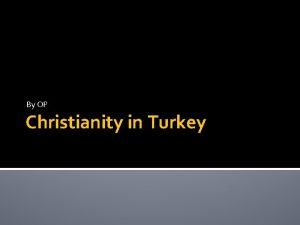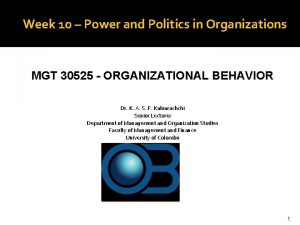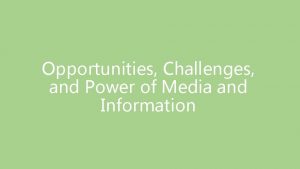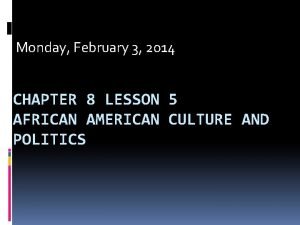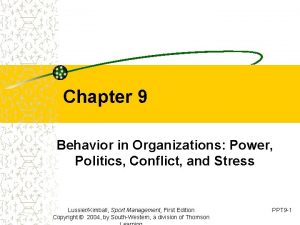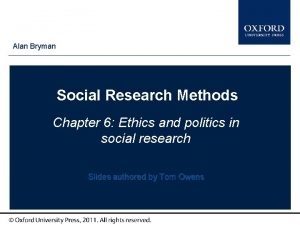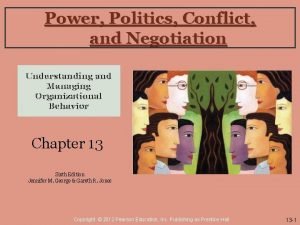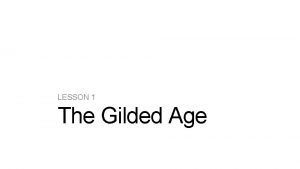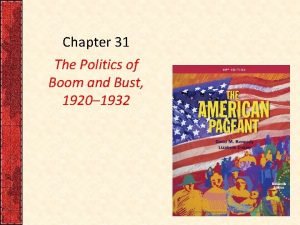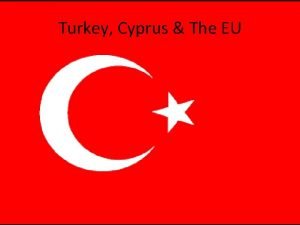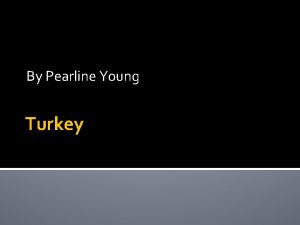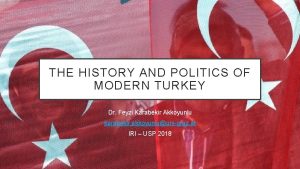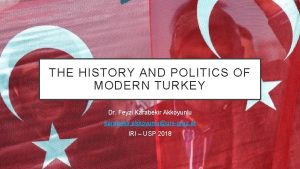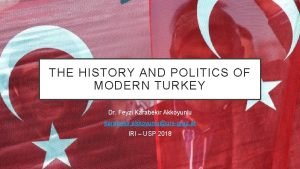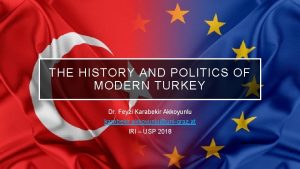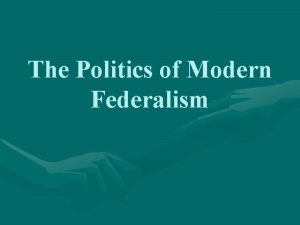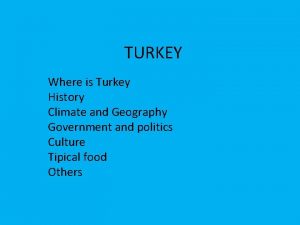THE HISTORY AND POLITICS OF MODERN TURKEY Dr













- Slides: 13

THE HISTORY AND POLITICS OF MODERN TURKEY Dr. Feyzi Karabekir Akkoyunlu karabekir. akkoyunlu@uni-graz. at IRI – USP 2018

THE AKP AND THE RISE AND FALL OF ‘THE TURKISH MODEL’ OVERVIEW • The roots of Political Islam in the 1990 s • Passive Revolution, Islamic Calvinism, Anatolian Tigers • What is the ‘Turkish model’? • “The Arab Spring and Turkish Democracy” – presentation by José • Explaning the success and transformation of the AKP • Documentary: “Flowers of Gezi Park”

POLITICAL ISLAM IN THE 1990 s Election campaign in Istanbul in the 1990 s – Welfare Party

POLITICAL ISLAM IN THE 1990 s Islamism / Political Islam • Political movements that take Islam as a key reference and mobilising framework • Often developmentalist, redistributive, anti-Semitic, anti. Israel • Diffuse sense of a ‘just’ or Islamic ‘order’ • Muslim Brotherhood since the 1930 s in the Arab World • Islamic Revolution of Iran in 1979

POLITICAL ISLAM IN THE 1990 s Milli Görüş (National View) • The sister movement to the Muslim Brotherhood in Turkey • Founded by Necmettin Erbakan • Different, as it evolves in a strictly secularist legal environment

POLITICAL ISLAM IN THE 1990 s Milli Görüş (National View) • The parties of Erbakan and the Milli Görüş tradition are repeatedly seen as threat to the secular order and outlawed by the Constitutional Court. • They are subsequently re-established under different names and with the same party ideology and cadres. • 1990 s see the rise of the Welfare Party (Refah Partisi). • Welfare wins Istanbul, Ankara and other cities in the 1994 local elections. • In 1996, it becomes the first Islamist party to form a governing coalition. • Overthrown in a “soft coup” in 1997.

POLITICAL ISLAM IN THE 1990 s Why 1990 s? • The military coup of 1980 • The crushing of the Left as a political alternative • Enforced Neoliberalisation • Corruption of the political class • Poor public services • Islamists promise delivery of public services; social and economic justice Newspapers on 28 March announce the Refah victory in Istanbul and Ankara. Below, Necmettin Erbakan and Tayyip Erdogan during an election rally.

‘Passive Revolution’ ‘Islamic Calvinism’ • Berkeley sociologist Cihan Tugal: • German political analyst Gerald Knaus: • “The Welfare municipalities have transformed Islamist radicals into conservative capitalists and have thereby de-radicalised them”. • Re-Interpretation of Islam for the needs of capitalism. Hard work and devotion seen as a form of worship. Creates the foundation of industrial success of Anatolian Tigers. ‘Anatolian Tigers’ • Conservative familyowned, export-oriented small to medium sized businesses based in provincial towns of Anatolia, which took off in the 1990 s and attained global success in the 2000 s.

POLITICAL ISLAM IN THE 1990 s Social conservatism The Gülen Movement Relatively rigid gender roles. • Established by the Sufi religious scholar Fethullah Gülen Attempt to bring modern life, progress and Islamic spirituality in conformity. • Began with pre-schools and turned into an empire of schools and prep-schools first in Turkey and then abroad • More than a thousand schools globally that affiliate with the Hizmet movement • Dozens of universities, particularly in the Balkans and Central Asia • Associations of business-men and exporters (TUSKON) • Crucial business networks • Followers increasingly present inside state institutions • Distinct from Milli Görüş • Gülen supports military coups, including against Welfare in 1997 • But is targeted by the anti-Islamist crackdown after the 97 coup. • Flees to the United States • After 2002, forms alliance with young reformist Islamists that form AKP Ideologically adaptable and flexible • • Classic Islamism Turkish Nationalism Dialogue of religions Globalisation

THE ‘TURKISH MODEL’ What is it? • Cihan Tugal: • “Marriage of formal democracy, free market capitalism and a (toned down) conservative Islam” --or simply-Islamic Liberalism • Promoted in the 2000 s by international business, media and foreign policy circles as antidote to anti-western Islamic radicalism.

THE ‘TURKISH MODEL’ Various Incarnations • Turkey as ‘little America’ under Menderes in the 1950 s. • Turkey as a pro-NATO free market Muslim country under Özal in the 1980 s. • Turkey as a ‘model’ for post-Soviet Central Asian Republics in the 1990 s. • Turkey as the ‘moderate Islamic model’ in the “war against terror” in the early 2000 s. • Erdogan’s Turkey as a model to post. Arab Spring Middle East in the 2010 s.

THE ARAB SPRING AND TURKISH DEMOCRACY

CHANGES AND CONTINUITIES FROM ATATÜRK TO ERDOĞAN Next (final) lecture: 27 September
 Christianity in turkey
Christianity in turkey Compare and contrast israel saudi arabia and turkey
Compare and contrast israel saudi arabia and turkey Power and politics in organizations
Power and politics in organizations Challenges of media information
Challenges of media information Chapter 8 lesson 5 african american culture and politics
Chapter 8 lesson 5 african american culture and politics Bureaucracy and politics in india
Bureaucracy and politics in india Power, politics and conflict in organizations
Power, politics and conflict in organizations Ethics and politics in social research bryman
Ethics and politics in social research bryman Power, politics and conflict in organizations
Power, politics and conflict in organizations Philosophy, politics and economics michael munger
Philosophy, politics and economics michael munger The tournament of today
The tournament of today Chapter 31 the politics of boom and bust
Chapter 31 the politics of boom and bust Chapter 20 whose government
Chapter 20 whose government Politics and international relations bsc
Politics and international relations bsc
